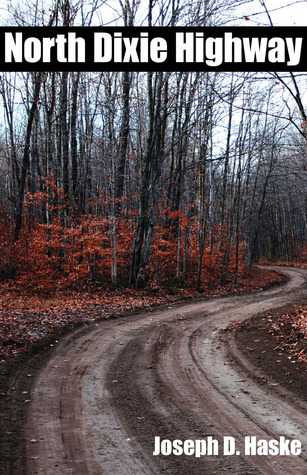Interview with Joesph D Haske, author of North Dixie Highway
2/20/15 INTERVIEW WITH JOSEPH D. HASKE, AUTHOR OF NORTH DIXIE HIGWAY 
Q: Why did you choose rural poverty as the environment for your first novel?
 A: As the cliché goes, I didn’t choose rural poverty so much as it chose me. The novel is set primarily in the place where I grew up, the eastern Upper Peninsula of Michigan. It’s undoubtedly one of the most beautiful places on earth, but it’s also one of the harshest environments I’ve experienced, especially in the winter. Summer brings in all sorts of tourism and some of the wealthiest people in the Midwest have summer homes on the islands and on the lakeshore, but most of the people who call it their home year-round see the place from a much different perspective. You can’t, in good conscience, write about a place like this and just ignore rural poverty because it is so prominent there. Well, I suppose Hemingway seems sort of oblivious to it in his work, but I find it impossible to just ignore these socio-economic concerns. Life in the U.P. is especially difficult in the fall, winter and spring, when the tourists are gone and it’s so much harder to eke out a living for so many locals. The experience in NDH is admittedly not every local person’s experience in northern Michigan, but it’s a common one. I come from a working class family myself and believe me, it’s not always easy to thrive in that environment.
A: As the cliché goes, I didn’t choose rural poverty so much as it chose me. The novel is set primarily in the place where I grew up, the eastern Upper Peninsula of Michigan. It’s undoubtedly one of the most beautiful places on earth, but it’s also one of the harshest environments I’ve experienced, especially in the winter. Summer brings in all sorts of tourism and some of the wealthiest people in the Midwest have summer homes on the islands and on the lakeshore, but most of the people who call it their home year-round see the place from a much different perspective. You can’t, in good conscience, write about a place like this and just ignore rural poverty because it is so prominent there. Well, I suppose Hemingway seems sort of oblivious to it in his work, but I find it impossible to just ignore these socio-economic concerns. Life in the U.P. is especially difficult in the fall, winter and spring, when the tourists are gone and it’s so much harder to eke out a living for so many locals. The experience in NDH is admittedly not every local person’s experience in northern Michigan, but it’s a common one. I come from a working class family myself and believe me, it’s not always easy to thrive in that environment.
Q: What drew you to write about Buck, a boy and young man in a family where hunting, drinking, and slaughtering fowl is an expected part of male maturation?
A: The hunting and fishing are ways that many middle-class, working-class, and poverty-stricken locals alike supplement their lack of income. It’s how one feeds the family. I remember entire winters when I was younger when pretty much the only meat we would eat was venison, small game, and perch. Trust me, the meat doesn’t usually go to waste up there and it’s not all about sport. Folks need to eat. It’s a very practical sort of rite of passage.
As far as the drinking goes, let’s just say that liquor, beer, and sometimes drugs, are an unfortunate but convenient substitute for the lack of access to mental health professionals among people of limited economic means. Hell, even the wealthy use alcohol and drugs this way at times, but as a coping mechanism, it’s much more common among the poor.
Q: Outdoors with the men, testing his mettle, chilled to the bone and often wet, Buck sometimes longs to be indoors in the warmth, where his family’s women spend more of their time. We never see Buck with a girlfriend, although we know he has been with women, at least physically. Does his upbringing handicap his ability to bridge the gap between the sexes? Is he less capable than the average young man of being domesticated into life in some woman’s warmth?
A: Much of the book is about the lack, what’s not there, or what’s just out of reach. There is very little of the beautiful summer that I mentioned earlier, because it is a story about the cold in every sense. Of course Buck has been with women physically, but his relationships with women do tend to be strained because of this upbringing. What complicates the issue further is that with some of the female role models he has, it’s hard to find any woman tough enough to live up to his standards, like both of the grandmothers for instance. Buck laments on relationships that haven’t worked out well for him for whatever reasons, but he’s young and there’s certainly still some hope for him, but given the events of the novel, he feels obligated to set aside these thoughts of relationships, or even other types of comfort, to deal with the task at hand.
Q: If we are nothing more than the sum of our heredity and environment, how much of Buck’s need for revenge do you see as in his gene pool and how much absorbed through life experience, including family socialization?
A: Sort of a nature vs. nurture question? In Buck’s case, I say it’s much more nurture, or lack thereof.
Q: Does an outdoor lifestyle in a cold climate, combined with poverty, invite heavy drinking?
A: It certainly invites monotony, so-called “cabin fever,” and many other problems which may lead people to drink. It might come as a shock to many readers, but the kind of drinking you see in the novel is not entirely uncommon in the eastern U.P. Some might think this aspect of NDH is an exaggeration, but I’ve seen it and experienced it firsthand.
Q: In North Dixie Highway animals are killed to be eaten and people killed for other reasons, including revenge in a feud of ambiguous origin between two families. After an attempted murder, Buck’s Uncle Jack says, “I tried to think of a fourteen point buck like you said. Couldn’t get over he was a man.” What, besides the fact that we aren’t cannibals, makes killing men different than killing animals? Does shooting animals make shooting men easier?
A: With most of Buck’s family, there is an underlying reverence for human life. They are capable of doing all sorts of violent things, and although hunting isn’t a problem for most of Buck’s family, or maybe even mutilation, killing another human being outside of conventional war goes too far for most of them. Part of it might be attributed to religion, or maybe just a fear of getting caught. The only character who doesn’t seem to have much of a problem with the idea of murder is Colonel Henry, and he’s not a blood relative. Hunting is a way of life for most of these characters, but they see murder as something distinct, something they don’t take lightly.
Q: Readers of what books do you see as North Dixie Highway readers?
A: Recently, I was fortunate enough to share the pages of a great new anthology called Stray Dogs: Writing from the Other America, with some amazing writers who address similar themes and concerns in their work: Dickey Betts, Sherman Alexie, Willy Vlautin, Vicki Hendricks, Chris Hedges, Chris Offutt, Jason Isbell, Daniel Woodrell, Patrick Michael Finn, Steven Huff, Eric Miles Williamson, Ron Cooper, Esther G. Belin, Michael Gills, Larry Foundation and Mark Turcotte. I think that people who like the work of writers such as these would like North Dixie Highway. I also believe that anyone who likes literary novels with a bit of grit would take something from my book. I understand that some people might not know what to make of NDH, but I think that any reader who gives it a chance and it takes it for what it is will appreciate it. It’s not for everybody, though. Even back home, people seem to have mixed feelings about it. Some have told me that they appreciate the honesty of the book while others are offended by the characters and how the place is depicted. It may not be everybody’s truth, but I guarantee that there is truth there.
Q: What are you writing now?
A: I’m working on two different novels, one set in south Texas where I currently live and teach, and another that takes place primarily in the E.U.P., like North Dixie Highway. I’m also working on a poetry collection, some individual stories and essays, and the translation of an amazing story collection by a Chilean writer, Gonzalo Baeza. It all makes me feel sort of schizophrenic, trying to find the time.
Q: What are a few of your all-time favorite books?
A: There are so many. The list could go on forever, but a few off the top of my head that have had an impact on me as a fiction writer, in a variety of ways, are: Moby Dick, Wise Blood, El Aleph, In Our Time, Dubliners, Absalom, Absalom!, Tobacco Road, Tropic of Cancer, the complete fiction of Chekhov. Then there are plenty of other influences from great classics to all sorts of contemporary works. I guess my affinity toward early 20th century American fiction writers is obvious though. I think that’s an amazing period for fiction, and I think that the best writing from then is still relevant in so many ways. I’m aware that a great many things have happened since then and are happening now, but I’ve never sought to merely imitate anyone—just learn something from them—take something and do my own thing. I also don’t feel as if a writer needs to incorporate trends and gimmickry or proclaim oneself avant garde to progress.
Gary Garth McCann
First-prize winner for short works and for suspense/mystery, Maryland Writers’ Association, Gary Garth McCann is the author of the novella Young and in Love? and of the novels The Shape of the Earth and The Man Who Asked To Be Killed, praised at the Washington Independent Review of Books. His most recent published stories are available online in Chelsea Station Magazine, Erotic Review Magazine, and in Mobius: The Journal of Social Change. His other stories appear in The Q Review, reprinted in Off the Rocks, in Best Gay Love Stories 2005, and in the Harrington Gay Men’s Fiction Quarterly. See his blogs at garygarthmccann.com and streamlinermemories.com.
- Web |
- More Posts(57)